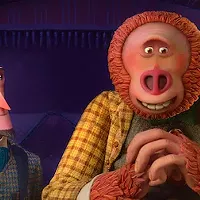

DOGVILLE
***1/2
DIRECTED BY Lars von Trier
STARS Nicole Kidman, Paul Bettany
"People are smart; they can handle it," states Agent J (Will Smith) in defense of the human race's ability to confront the unknown. "A person is smart," responds Agent K (Tommy Lee Jones). "People are dumb, panicky, dangerous animals."
Dogville expands these parameters. The individual citizens in the titular town, a Rocky Mountain community existing day-by-day during the Great Depression, can between them cover the gamut of the Boy Scout decree: trustworthy, loyal, helpful, friendly, and so on and so forth. But when they come together as a mob -- when their actions are ruled by community conformity rather than individual thought -- they reveal themselves as petty, contemptuous creatures, perhaps even lower than dangerous animals.
It's the foibles of this isolated burg's residents that are at the black heart of Dogville, a rabble-rousing piece that has fiercely divided critics and audiences ever since it premiered at Cannes almost a year ago (it debuted stateside during last October's New York Film Festival). Hailed as a masterpiece in many quarters, it has also earned its fair share of brickbats, with most of the barbs accusing it of being pretentious and/or misogynistic. Plus, detractors point out, von Trier has never set foot on US soil, so how can he possibly make a movie that can be so critical of this country?
Admittedly, there's a whiff of pretentiousness surrounding Lars von Trier that can't be shaken: The very notion of Dogme 95 is a tad fey, and the aristocratic-sounding "von" isn't even part of his birth name (he added it in his early 20s while at film school). And the fact that the man has messy personal stories when it comes to women -- his mom confessed on her deathbed that the person he always believed to be his biological father wasn't (his real dad turned out to be her boss); he reportedly abandoned his pregnant wife for their young babysitter; etc. -- has provided his critics with plenty of ammo to make the claim that instead of idolizing his lead female characters (in Breaking the Waves, Dancer In the Dark and now this), he actually despises them as only a chauvinist pig can, by putting them through all manner of humiliation.
There may be slivers -- perhaps even whole tree trunks -- of validity in all these charges, but they can just as easily be punctured and deflated. But we're getting ahead of ourselves -- and the story.
Armed with the minimalist trappings of a filmed stage play, Dogville can't be bothered with the excess of set design: Its town, and almost everything in it, is represented by chalklines on the floor, with only an occasional chair or table allowed to convey the barest illusion of houses. Into this village marches Grace (Nicole Kidman, in a strong performance that goes with the flow), a mysterious woman on the run from. . . something. Viewing this stranger as an opportunity to put his theories about morality into action, the town's philosopher, a struggling writer named Tom Edison Jr. (Paul Bettany, Master and Commander's ship doctor), talks his neighbors into allowing Grace to remain in Dogville. The townspeople, including Tom's congenial father (Philip Baker Hall), a brusque store owner (Lauren Bacall) and a dour couple (Stellan Skarsgard and Patricia Clarkson) with six children, reluctantly agree, and before long Tom is pleased with what he sees: his fellow residents accepting Grace as part of the community, paying her fair wages for the work she does (cleaning, babysitting, picking apples) and providing her with her own makeshift home.
As indicated by her name, Grace radiates nothing but goodness and beauty - there's no reason for anybody to harbor ill feelings toward her. But once it looks like she's wanted by the police for questioning, their attitudes change. In return for hiding her, the citizens force Grace to work more hours for less pay, and before long she becomes nothing more than the town slave. After she tries to escape (with Tom's help) and is recaptured, her life becomes unendurable, chained like a dog, repeatedly raped by the men and verbally abused by the women.
Like the characters portrayed by Emily Watson in the powerful Breaking the Waves and Bjork in the insufferable Dancer In the Dark, Kidman's Grace initially seems to be the latest von Trier heroine who must sacrifice herself for some greater, abstract good. Yet Grace possesses an inner fortitude the other women lacked that allows her to weather the brutalities and eventually unleash her own version of Armageddon against the town.
The charges against Dogville claiming it's shallow and pretentious may indicate that we're at a point where we should just throw up our hands and require our movies to be nothing more than fluffy entertainment -- regardless of von Trier's occasionally overbearing delivery, the man explores relevant issues that most other filmmakers won't touch. And if Dogville is a work of towering misogyny, then what does that say about most of the other movies being produced every year? The character of Grace -- a smart, resourceful woman who ultimately gives as good as she gets -- doesn't come close to being offensive when contrasted with the airheads who stumble through slasher flicks or the incompetent female detectives who bumble through thrillers. And the oft-stated claim that von Trier has no business making a movie about America when he's never set foot in this country is laughable: Francis Coppola didn't fight in the Vietnam War before making Apocalypse Now, Stanley Kubrick didn't visit outer space before filming 2001: A Space Odyssey, and, as von Trier himself noted, "As far as I can recall, they never went to Casablanca when they made Casablanca."
Von Trier also stated, "In my "American' films, I mirror what information comes to me and my feelings about that information. Of course, it isn't the truth because I've never been there." This is perhaps a statement made in reflexive self-defense against his bashers, but it's a wholly unnecessary one. The bracing reality of Dogville is that it does tell the truth -- its points may be overwhelmingly negative, but that doesn't make them any less valid. How can anybody confront the film's politics and cry foul, when the specters of slavery, internment, genocide, witch hunts (of both the Salem and Hollywood variety), poverty, and corruption (to cite but a handful) continue to shadow our country's every move? Dogville is irrevocably a movie of our times, a period during which substantial groups gather to burn Dixie Chicks CDs, vast numbers make political decisions based on soundbites of misinformation, and suspicions of "outsiders" have rendered many Americans as fearful as a 5-year-old terrified of the Boogeyman under his bed.
Lars von Trier isn't telling us we should hate our country -- why should he, and why would we listen, when there are so many great things about it worth cherishing? All he's suggesting is that we take a long, hard look around us, with blinders off and without eyes wide shut.


